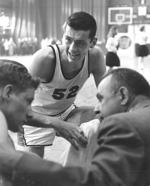“Where have you gone, Joe DiMaggio?
Our nation turns its lonely eyes to you.”
— Paul Simon
In September 1981, New Jersey Sen. Bill Bradley visited St. Louis. I was given the plum assignment of interviewing him.
The story was slotted for the front page of the Sunday features section. In those days, the features section was called the Everyday Magazine, and a front page Sunday story was a big deal, especially to me, a relative newcomer. I’d been at the paper for about a year.
Bradley was a mythological figure. He was a small-town kid — Crystal City, 45 miles south of here — who was such a phenom in high school basketball that everybody in St. Louis who followed sports knew about him and, of course, all the big-time collegiate programs wanted him. He had 75 scholarship offers. He turned them all down and went to Princeton. That didn’t surprise anybody who knew him. His fourth-grade teacher said that she had predicted — long before he became famous as an athlete — that he would be president by the time he was 40. A kid in Crystal City. Did any teacher in Hannibal know that Sam Clemens was going to be Mark Twain?
People are also reading…
While Bradley's decision to spurn the blue-chip basketball schools didn’t surprise his old teachers, it shocked the sports public.
What was he thinking? Had he never heard of the NBA?
He averaged more than 30 points a game during his career at Princeton. Those were the days before the three-point shot, and Bradley, who was 6-foot-5-inches, was a terrific shot.
He was NCAA Player of the Year in 1965, the year he carried Princeton to the Final Four. In one tournament game, he scored 58 points. He was named MVP of the tournament.
He was drafted by the New York Knicks but put off an NBA career to study at Oxford on a Rhodes Scholarship.
Two years later, he came back to the states, signed with the Knicks and was an integral part of two NBA championship teams.
He retired in 1977 and the next year ran for the U.S. Senate in his adopted state of New Jersey. He ran against the Establishment choice. Bradley won. How could he not become president? That was the thinking when he visited St. Louis in 1981.

Bill Bradley
A couple of years earlier, when I was a reporter in Phoenix, I had bought a micro-cassette tape recorder. It was a bit high-tech for me, but a friend had bought one and I thought it was really cool.
I used that recorder when I interviewed Bradley. He had a busy schedule, but he was generous with his time. We might have talked for half an hour. At the end of the interview, I paused, very professionally, and said, “Let me just make sure that I got this.” And I checked my recorder.
Nothing. Zero.
I had taken only a few notes.
“Is there a problem?” Bradley asked.
There is, I said. My recorder didn’t work.
He chuckled. That is an old-fashioned word, but it is exactly what he did. He chuckled. He suggested that we go back over the things I had found interesting, and this time, I could take notes.
His aide seemed appalled. We have a schedule, he said.
Bradley chuckled again and motioned for me to go on.
I saw Bradley again in 1992 at the Democratic convention at Madison Square Garden. He gave the keynote address that year, and I wrote that it was a less than a stellar performance. Which was fine, I thought, because otherwise he would have been the Man Who Should Have Been the Nominee. His Knicks jersey hung in the rafters.
The morning after the keynote, he spoke at a breakfast for the Wisconsin delegation. In a small room, he was much better. He connected with the crowd. He talked about economic justice. He talked about the country’s wealth being concentrated in too few people. This is unsustainable, he said. He was not smooth, but persuasive. He had studied history and economics at Oxford, and it showed.
He retired from the Senate after three terms. He said our political system was broken.

FILE PHOTO FROM MARCH 1961 -- Bill Bradley, facing camera, engages in a team huddle on sideline with Crystal City coach, Arvel B. Popp (pronounced Pope). Bradley is most celebrated basketball player Popp has had in 13 years at the Jefferson County school.
He returned to political life in 2000 when he ran in the Democratic presidential primary against the prohibitive favorite, Vice President Al Gore. Bradley was swamped. Three of his major issues were universal health care, gun control and campaign finance reform. He did not win a single primary.
I thought about Bradley when Princeton beat Missouri earlier this month. I thought about him again when I was visiting my son in Austin, Texas, this past week. I had arrived the day Donald Trump had his rally up the highway in Waco.
I am your retribution, Trump promised the crowd, and the crowd roared its approval.
No shining city on a hill. No 1,000 points of light. Those were Republican talking points in the past. Now it’s retribution.
It seems to be the white version of reparations.
I understand the desire for both. Some folks didn’t get a fair start, and others have been left behind.
However, I am a member of the petite bourgeoisie, fat and comfortable. I do not want to overthrow the system. Tinkering with it would be enough for me.
The Republicans, with their allegiance to Trump and his talk of retribution, frighten me the most. How I wish the Democrats had someone more energetic than Joe Biden to counter the threat. Biden is just too old. He makes a visible effort to maintain a steady gait. I notice it because I find myself doing the same. The Dems need a young Bill Bradley.
His latest contribution to the public debate was his 2012 book, “We Can All Do Better.”
Maybe we could have, but we didn’t. Things are worse now than they were in 2012.
Of course, it’s silly to daydream about the old heroes. You can’t expect yesterday’s heroes to pull us out of today’s mess.
By the way, Bradley is eight months younger than Biden. So yes, too old to come to the rescue.
4/27/67: NEW YORK — Bill Bradley returns from Rhodes scholarship study to play for Knicks.
"come" - Google News
April 01, 2023 at 06:00PM
https://ift.tt/YUgEa4K
McClellan: We need a Bill Bradley to come to the rescue - St. Louis Post-Dispatch
"come" - Google News
https://ift.tt/Rm1x4cA
Shoes Man Tutorial
Pos News Update
Meme Update
Korean Entertainment News
Japan News Update
Bagikan Berita Ini














0 Response to "McClellan: We need a Bill Bradley to come to the rescue - St. Louis Post-Dispatch"
Post a Comment